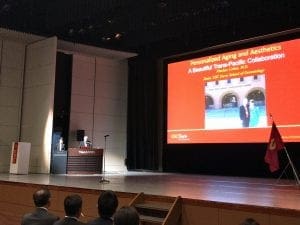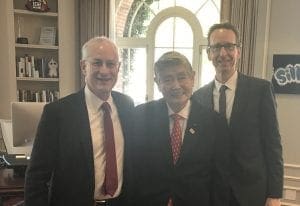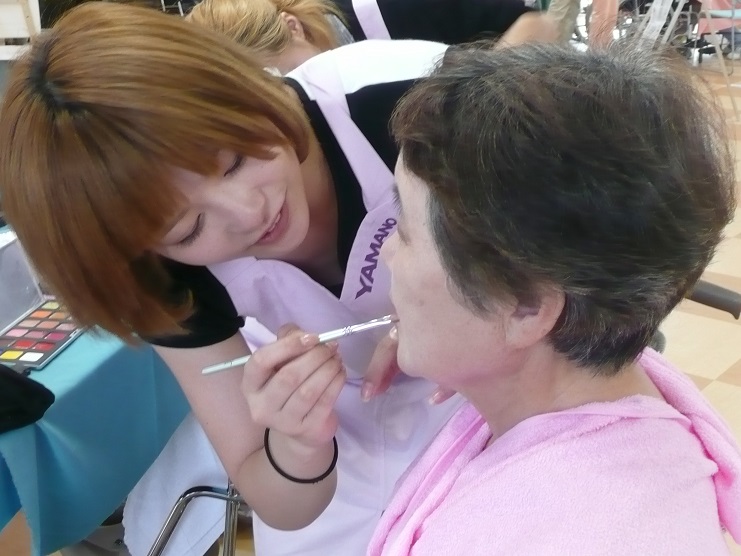A collaboration with the USC Leonard Davis School provides gerontology training
From the dramatic hairdos and makeup made famous through the centuries-old Geisha culture to the fashion-forward stylings of today’s Harajuku girls, Japan has long been a world leader in beauty trends.
As part of what is called a super-aging society, the Yamano Beauty College in Japan is at the vanguard of another movement as well.
Through a unique partnership with the University of Southern California Leonard Davis School of Gerontology, the school is preparing beauticians-to-be to meet the needs of Japan’s older adults. From health screenings to house calls, this collaboration recognizes the front-line role today’s beauty school students will play in caring for aging clients in Japan, the country with the oldest population in the world.

USC Leonard Davis School Dean Pinchas Cohen spoke to nearly 1000 students and guests at the Yamano Beauty College in June 2017.
Pinchas Cohen, dean of the USC Leonard Davis School of Gerontology, recently addressed close to 1000 students and guests at the Yamano campus in Tokyo. His lecture, a look at 21st century trends in the science and study of aging, is just one of the ways that the beauty college is ensuring students can help support the aging population of Japan, where more than one in four people are over the age of 65 today and it is expected that one in three will be by the year 2050.
Beauty is for All Ages
81-year-old Mike Yamano, whose parents founded the original Yamano school in 1934, approached the USC Leonard Davis School, a global leader in gerontology research and education, with a vision to incorporate gerontology education in his curriculum. Gerald Davison, then-dean of the USC Leonard Davis School, warmly embraced this collaboration and proceeded to initiate the first-generation of this program.
The USC Leonard Davis School-developed curriculum, unique for a beauty school in Japan and perhaps anywhere in the world, provides a broad introduction to the health, social and economic aspects of aging in society. The Yamano Beauty College also offers a Health and Welfare course, which includes instruction in practical matters ranging from how operate a wheelchair to how to wash and cut bed-bound clients’ hair.
“Nobody in Japan paid attention to the needs of older adults until we started our wellness course and our program with the USC Leonard Davis School of Gerontology,” said Mike Yamano, the former chancellor of the Yamano Beauty schools and a strong advocate for linking aging and aesthetics. “Beauty is for all ages, and I believe that when you look better, you feel better, too.”
A Model for Learning

USC Leonard Davis School Dean Pinchas Cohen (left) introduces Mike Yamano (center) to USC Provost and Senior Vice President for Academic Affairs Michael Quick on July 11, 2017. As part of the USC Lifespan Health Initiative, the university has committed to researching and developing ways to promote healthier lifespans in an aging world.
Through a self-paced online course, USC delivers 60 hours of specialized training to vocational and junior college students at the Yamano Beauty College. So far, 2,600 students have gone through the course, with another 400 or so expected to earn their certificates of completion soon.
“We are very proud of our partnership with the Yamano Beauty College and the ways it helps prepare students to support an aging client base,” said Pinchas Cohen, dean of the USC Leonard Davis School of Gerontology. “Thanks to Mike Yamano’s vision, we now have a model for bringing gerontology awareness and education to service providers who are increasingly working with older adults.”
The USC Leonard Davis School also provides educational materials to other industries that serve growing numbers of older clients, including in areas of financial planning and home renovations. The aim is to increase aging awareness and empathy among service providers who may already have long-term, trusted relationships with their clients.
“Through our collaboration with the Yamano Beauty College, we are arming an already-existing workforce with specialized knowledge and education that can help them provide additional support to older adults they see regularly and may know quite well,” said Maria Henke, senior associate dean of the USC Leonard Davis School and a key author of the custom gerontology curriculum. “We know this can apply to many other sectors as well.”
Permanent Waves and a Personal Approach
Yamano Beauty College was founded in 1934 by Aiko Yamano, an innovator who opened her first salon at 16 and brought the first permanent wave machine to Japan. Her husband Jiichi was the implementer – he helped set up the country’s beauty association and the rigorous national system for training and licensing students.
Today the Yamano Beauty College has over 210,000 graduates and remains a family affair. It is now run by Jane Aiko Yamano, granddaughter of the founders and daughter of Mike Yamano, who introduced the gerontology curriculum and served as chancellor prior to Jane. The school retains its legacy as an institution known to encourage experimentation while also honoring Japan’s past, with instruction in the Japanese cultural arts of kimono wrapping and flower arranging. Increasingly, students say are also drawn to the gerontology curriculum and the opportunities it provides.
“As a result of taking the course I now want to do a job in the future in which I can connect gerontology and cosmetology together,” said second year student Kazuki Fujimoto.
Her classmate Yuga Fujimoto agrees and looks forward to helping her older clients both look and feel better.
“By learning gerontology, we can offer not only technical services, but also design and fashion suggestions, as well as terrific smiles,” she said.
For many older adults, that personal connection may just provide the biggest boost of all.





